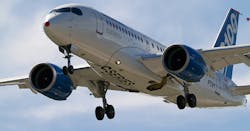Bombardier's C Series Jet Regains US Access in Win over Boeing
Welcome back to America, C Series.
Bombardier Inc.’s marquee jet, slapped with crushing U.S. tariffs last year, got a new lease on life when an American trade panel nixed the duties. The Friday ruling, a surprise defeat for Boeing Co., enables Bombardier to jump-start sales campaigns in the world’s largest aircraft market.
A revival of orders would help debt-laden Bombardier, Canada’s largest aerospace company, add momentum to its comeback. Chief Executive Officer Alain Bellemare thrilled investors in October by forging a C Series partnership with Airbus SE. Now the two planemakers are poised to win new customers for the cutting-edge jetliner in Boeing’s backyard.
“Other airlines in the U.S. are probably going to take a closer look,” said Dan Fong, an analyst at Veritas Investment Research Corp. in Toronto. “If you get another U.S. anchor, it will accelerate the sales momentum globally. The U.S. is home to the most experienced aircraft operators in the world, and everyone will be keeping an eye on what happens there.”
Bombardier surged 16% to C$3.54 at the close in Toronto on Friday, the biggest gain in almost two years for the Montreal-based company. The shares are at their highest level in three years.
Boeing was little changed at $343.22, missing out on a defense-industry rally spurred by a report of stepped-up U.S. military spending.
Trade Ruling
The U.S. International Trade Commission ruled Friday that American industry isn’t being harmed by C Series sales.
The unanimous vote blocked a Commerce Department decision last year to impose duties of almost 300% after a complaint by Boeing. The Chicago-based company said Bombardier sold the C Series in the U.S. at less than fair value while benefiting from government subsidies.
The decision means Bombardier can make deliveries to Delta Air Lines Inc. The U.S. carrier threw a lifeline to the slow-selling jets in 2016 by ordering at least 75 CS100 planes, in a deal with a list value of $5.6 billion at the time.
Before that, Bombardier had struggled to gain a U.S. foothold while production of the single-aisle plane fell more than two years behind schedule and costs ballooned to more than $2 billion over budget.
Bombardier spent more than $6 billion to develop the C Series after launching it in 2008, equipping the aircraft with fuel-efficient engines, large windows and a wider-than-usual middle seat. Passenger capacity ranges 108 to 160.
Sales Prospects
Chief on the list of U.S. sales prospects is JetBlue Airways Corp., which earlier this year delayed a decision on updating its fleet of regional jets. Fabrice Bregier, Airbus’s chief operating officer, identified JetBlue as a possible customer in an October interview.
“JetBlue’s another potential anchor,” Fong said.
The carrier was one of at least three U.S. operators -- the others were Spirit Airlines Inc. and Sun Country Airlines -- that wrote to the Commerce Department and the International Trade Commission last year to express support for Bombardier. JetBlue has held discussions with Bombardier about the C Series, Bloomberg News reported in 2016. The New York-based airline didn’t immediately respond to a request for comment.
While Bombardier has a second U.S. customer in Republic Air, the carrier’s status is anything but certain. Republic has a firm order for 40 jets, but it reached a confidential settlement with Bombardier in 2016 to defer deliveries for an undisclosed period.
'Not Over'
It’s possible Boeing hasn’t said its last word. After the trade panel’s ruling, the company said it would review the decision and vowed not to stand by as Bombardier’s “illegal business practices” hurt U.S. workers and companies. Boeing has forged close ties with President Donald Trump, who recently slapped tariffs on imported solar panels and washing machines on the grounds that they’re harming U.S. industry.
Unfair competition threatened the survival of the 737 Max 7, the smallest of Boeing’s upgraded single-aisle jets, the U.S. aerospace giant said. That plane and the C Series can carry similar passenger loads, depending on how they’re configured. Boeing is in talks about a potential combination with the Canadian company’s top rival, Embraer SA, which sells planes that directly compete with the C Series.
Boeing can appeal to the U.S. Court of International Trade, Terence Stewart, managing partner at Washington law firm Stewart & Stewart, said Friday in an interview. Canadian lawmaker Andrew Leslie, the parliamentary secretary to Foreign Minister Chrystia Freeland, isn’t taking anything for granted.
“It’s not over yet,” Leslie, whose minister is responsible for U.S.-Canada ties, told reporters Friday in Montreal. The ITC’s ruling “is not the final stage in this process,” he said.
Alabama Manufacturing
Airbus and Bombardier believe they have a solution to remove the risk of future duties once and for all: a U.S.-made C Series.
The companies are pressing ahead with a plan to manufacture the planes in Mobile, Ala., where the European company makes single-aisle planes. The new assembly line, with an estimated cost of $300 million, would complement Bombardier’s factory in Mirabel, Quebec.
“Building the plant eliminates any of that future risk that duties can be imposed at a later date,” said Cam Doerksen, an analyst at National Bank Financial in Montreal. “If you believe Airbus and Bombardier will be able to sell a lot more aircraft through their partnership than what the current plant in Mirabel can accommodate, why not build that capacity in Alabama instead? Absolutely it’ll get built.”
After the International Trade Commission’s decision, Bombardier reaffirmed its commitment to build in Mobile once the Airbus deal is completed. The closing is expected to occur later this year.
The unanimous trade ruling, coupled with the Alabama plan, puts the C Series “on the right path to re-enter the U.S. market,” Fadi Chamoun, a BMO Capital Markets analyst, said in a note to clients. “A cloud has been lifted.”
By Frederic Tomesco
About the Author
Bloomberg
Licensed content from Bloomberg, copyright 2016.
